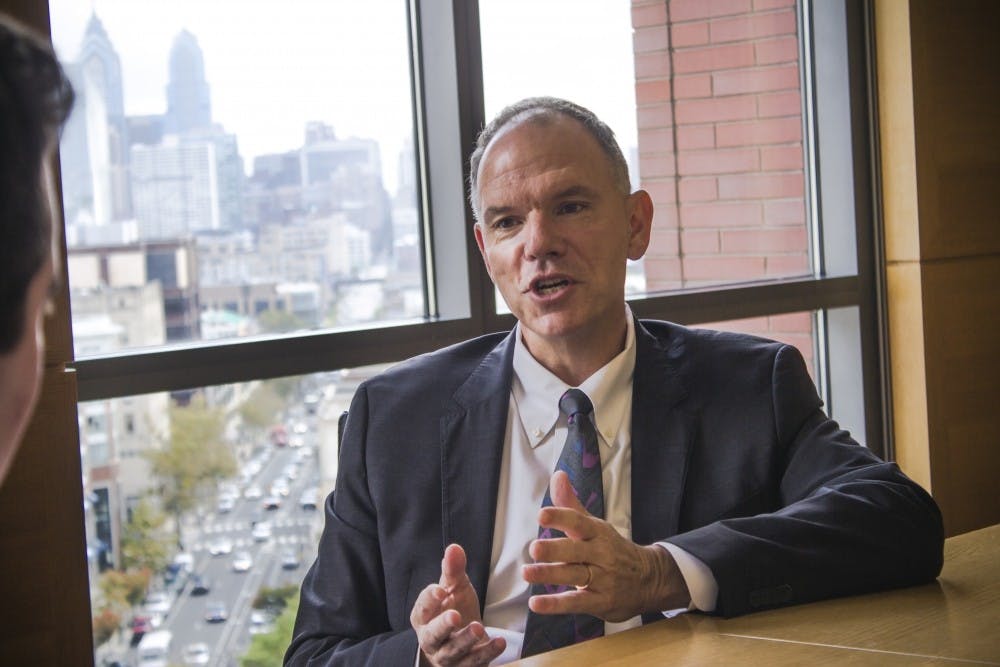In 1881, wealthy industrialist Joseph Wharton gave $100,000 to Penn to establish the nation’s first collegiate business school. Wharton envisioned a school that would “provide for young men special means of training and of correct instruction in the knowledge and in the arts of modern Finance and Economy.” Throughout the Wharton School’s more than 130-year history, it has witnessed the creation of the Dow Jones Industrial Average and the S&P 500, the Great Depression and the dot-com bubble.
U.S. News and World Report consistently ranks Wharton as a top school for finance education, giving it the number one spot for graduates and undergraduates in 2014 — and a reputation as a training camp for future Wall Streeters. Geoffrey Garrett, Wharton’s new dean, wants that reputation to change.
“When I walk into my office everyday, I see a sign that says ‘The Wharton School of Finance and Commerce’ — the way this school was founded,” Garrett said in reference to a stone carving in the lobby of Steinberg-Dietrich Hall. From 1902 to 1971 , Wharton’s official name, now simply the Wharton School, included the terms “finance” and “commerce.”
“What I see and what I know is that while Wharton has an extraordinarily preeminent position in the world of finance ... Wharton is much more than a finance school,” he said.
Among Garrett’s top priorities for his deanship is his desire to communicate Wharton’s value in fields beyond finance. He especially wants to promote Wharton’s focus on analytics, innovation and entrepreneurship — three things that he believes are essential to a business education.
An image of innovation and entrepreneurship is something the school has struggled with in recent years, perhaps most notably with the publication of an article in The Wall Street Journal in September 2013 entitled “What’s Wrong With Wharton?” Author Melissa Korn asserted that the school’s MBA applications dropped 12 percent in four years because “Wharton has lost its luster as students’ interests shift from finance to technology and entrepreneurship.”
MBA applications rose slightly in the most recent application cycle.
“Wharton, in its DNA, is a profoundly entrepreneurial place,” Garrett said. He believes that innovation and entrepreneurship reverberate through all of Wharton, including in the field of finance.
“When I look at private equity, hedge funds and the like that’s seriously financial entrepreneurship where Wharton and Wharton students and Wharton alums are being world leaders,” he said, noting that entrepreneurialism is not limited to Silicon Valley.
“We’d like to take a larger piece of the Silicon Valley mindset,” said Vice Dean Eric Bradlow, who is chair of the Marketing Department. “That’s a very good thing for the school.”
Chair of the Finance Department David Musto also believes that the finance industry can be entrepreneurial and often intersects with the tech sector.
Musto looks at Wharton graduates’ careers to assess the relevance of the current finance curriculum. He pointed to 2002 graduate Jesse Cohn, an activist investor in Silicon Valley at hedge fund affiliate Elliott Management. Cohn helps restructure companies, a task that mimics building a company from scratch, even though his background is in finance.
Furthermore, he explained that the finance part of the MBA program has, in recent years, shifted away from a focus on managing money.
“[MBA students’] interest in finance tends to be more from a sell-side perspective or in consulting,” Musto said. “That has this entrepreneurial feeling to it.”
Garrett does not want to de-emphasize Wharton’s finance reputation, though. He thinks the school has an edge in analytics that will keep its graduates at the forefront of finance fields but at the forefront of other fields as well.
“If I look at what makes Wharton finance great, it’s what I think makes Wharton great as a whole, which is its rigorous focus on data and analytics,” he said. “I think that’s going to be more important in a big data era than it’s ever been before.”
“I like that Wharton’s known for finance. I think that’s a good thing. It’s a very good thing,” Bradlow said. “But, it doesn’t mean that Wharton can’t be known for other things.”



